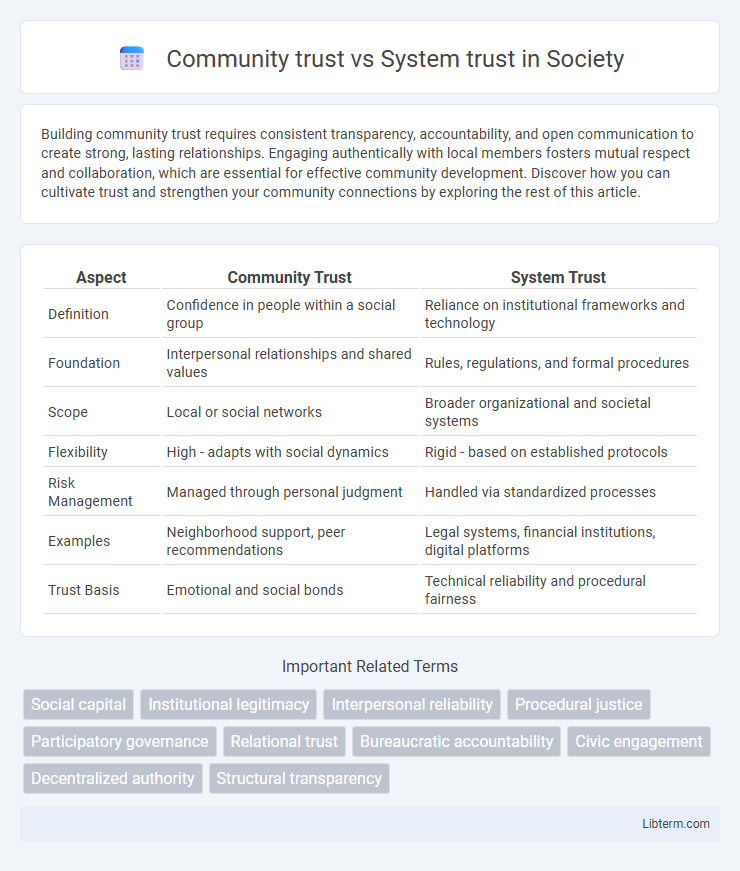Building community trust requires consistent transparency, accountability, and open communication to create strong, lasting relationships. Engaging authentically with local members fosters mutual respect and collaboration, which are essential for effective community development. Discover how you can cultivate trust and strengthen your community connections by exploring the rest of this article.
Table of Comparison
| Aspect | Community Trust | System Trust |
|---|---|---|
| Definition | Confidence in people within a social group | Reliance on institutional frameworks and technology |
| Foundation | Interpersonal relationships and shared values | Rules, regulations, and formal procedures |
| Scope | Local or social networks | Broader organizational and societal systems |
| Flexibility | High - adapts with social dynamics | Rigid - based on established protocols |
| Risk Management | Managed through personal judgment | Handled via standardized processes |
| Examples | Neighborhood support, peer recommendations | Legal systems, financial institutions, digital platforms |
| Trust Basis | Emotional and social bonds | Technical reliability and procedural fairness |
Understanding Community Trust: Foundations and Importance
Community trust is built on shared values, consistent interactions, and transparency within a group, fostering a sense of security and cooperation among members. It serves as the foundation for social cohesion, enabling collaboration and collective decision-making that rely on mutual respect and reliability. Understanding community trust involves recognizing its role in promoting accountability and resilience, which are essential for the sustainable development of strong, interconnected societies.
Defining System Trust: Mechanisms and Structures
System trust is established through formal mechanisms and institutional structures that ensure reliability, transparency, and accountability within organizations or technological frameworks. Key components include regulatory compliance, standardized protocols, and automated verification processes that reduce uncertainty and promote consistent performance. These elements function collectively to build confidence in the system's integrity and operational predictability.
Key Differences Between Community and System Trust
Community trust relies on interpersonal relationships, shared values, and social cohesion, fostering trust through transparency and mutual understanding among individuals. System trust is based on the reliability, consistency, and security of institutions, technologies, or formal processes that operate independently of personal relationships. Key differences include community trust's dependence on social networks versus system trust's emphasis on rules, protocols, and evidence of performance.
Factors Influencing Community Trust
Community trust is primarily influenced by factors such as shared values, transparency, and consistent communication among members, which foster a sense of belonging and reliability. Social norms, reputation systems, and direct interpersonal experiences also play critical roles in reinforcing trust within community settings. Unlike system trust, which relies heavily on technical safeguards and institutional guarantees, community trust depends more on relational dynamics and active participation.
Drivers of System Trust in Modern Society
System trust in modern society is predominantly driven by transparency, reliability, and the effectiveness of institutional frameworks. Technological advancements enhance system trust by providing secure, verifiable processes, such as blockchain for data integrity and AI for efficient decision-making. Consistent regulatory enforcement and responsive governance further reinforce public confidence in systemic operations beyond interpersonal relationships.
Trust Dynamics: Personal Relationships vs Institutional Reliability
Community trust thrives on personal relationships, where trust is built through repeated social interactions and shared experiences within a tight-knit group. System trust depends on institutional reliability, where confidence is established through consistent performance, transparency, and adherence to formal rules and standards. Trust dynamics shift as community trust relies on emotional bonds and social cohesion, while system trust hinges on evidentiary accountability and procedural integrity.
Challenges Undermining Community and System Trust
Challenges undermining community and system trust often stem from transparency deficits, inconsistent communication, and vulnerability to misinformation. Security breaches and data privacy concerns erode system trust by exposing weaknesses in technology infrastructures and governance. Social fragmentation and lack of inclusive participation contribute to community distrust, weakening collective resilience and collaboration efforts.
Building and Sustaining Community Trust
Building and sustaining community trust requires transparent communication, consistent ethical behavior, and active engagement with community members to address their needs and concerns. System trust depends on reliable, secure technology and clear governance policies that ensure fairness, accountability, and protection of individual rights. Prioritizing both interpersonal relationships and robust system infrastructures fosters a resilient environment where community members feel confident and supported.
Enhancing System Trust: Strategies and Solutions
Enhancing system trust involves implementing robust cybersecurity measures, transparent data handling practices, and consistent system performance to ensure user confidence. Strategies such as employing end-to-end encryption, regular security audits, and clear privacy policies build a foundation of reliability and integrity for digital platforms. Incorporating user feedback loops and AI-driven anomaly detection further strengthens system trust by proactively addressing vulnerabilities and aligning with user expectations.
The Future of Trust: Integrating Community and System Approaches
The future of trust hinges on integrating community trust, grounded in interpersonal relationships and local knowledge, with system trust, based on institutional reliability and technological frameworks. Advances in blockchain and decentralized platforms enhance transparency and accountability, bridging gaps between personal interactions and formal systems. This hybrid approach fosters resilient ecosystems where trust is both socially constructed and technologically reinforced, enabling scalable and adaptive trust networks.
Community trust Infographic

 libterm.com
libterm.com